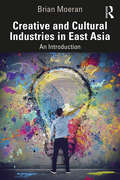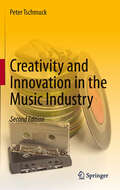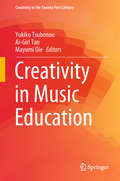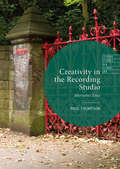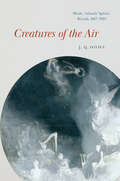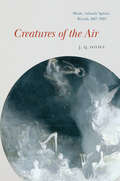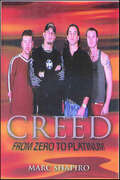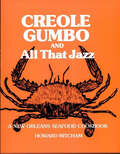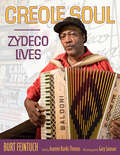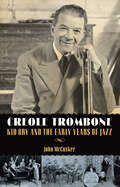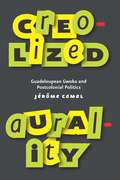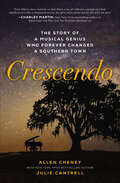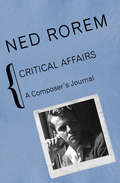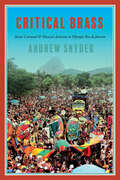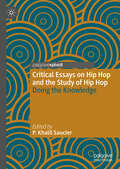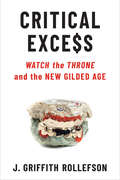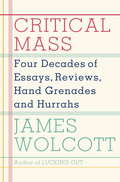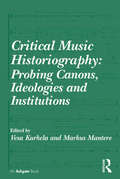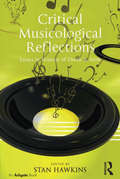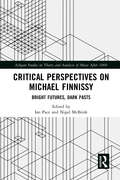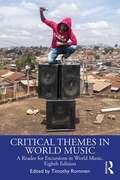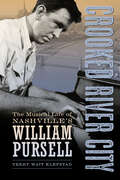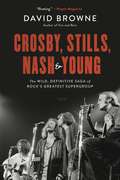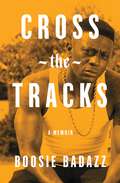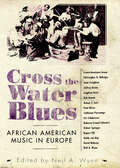- Table View
- List View
Creative and Cultural Industries in East Asia: An Introduction (Creative and Cultural Industries in Asia)
by Brian MoeranThis book presents an introductory overview of the socio-economic organization of creative industries, focusing on the East Asian context. Establishing a theoretical framework founded on the work of Richard Caves, Howard Becker, and Pierre Bourdieu, this textbook is an accessible introduction to creative and cultural industries, drawing on examples from Japan, South Korea, and China. It both examines what is unique about cultural production in these countries and places them in a global and intercultural context. Building on themes of uncertainty and networks of cooperation, Brian Moeran looks at the role of social ties in defining notions of quality. He then analyses the positioning of individual actors, organisations, and commodities in each field of cultural production and the exchanges of economic and symbolic capital that take place between them. Examples are taken from a range of cultural and creative industries, including film, music and fashion. Overall, Creative and Cultural Industries in East Asia serves as a foundational introduction to the study of creative and cultural production in East Asia.
Creativity and Innovation in the Music Industry
by Peter TschmuckWhy did jazz become a dominant popular music genre in the 1920s and rock 'n' roll in the 1950s? Why did heavy metal, punk rock and hiphop find their way from sub-cultures to the established music industry? What are the effects of new communication technologies and the Internet on the creation of music in the early 21st century? These and other questions are answered by Peter Tschmuck through an integrated model of creativity and innovation that is based on an international history of music industry since Thomas A. Edison invented the phonograph in 1877. Thus, the history of the music industry is described in full detail. By discussing the historic process of music production, distribution and reception the author highlights several revolutions in the music industry that were caused by the inference of aesthetic, technological, legal, economic, social and political processes of change. On the basis of an integrated model of creativity and innovation, an explanation is given on how the processes and structures of the present music industry will be altered by the ongoing digital revolution, which totally changed the value-added network of the production, dissemination and use of music. For the second edition, the author has reworked chapter 9 in order to include all the developments which shaped the music industry in the first decade of the 21st century - from Napster to cloud-based music services and even beyond.
Creativity in Music Education (Creativity In The Twenty First Century Ser.)
by Ai-Girl Tan Yukiko Tsubonou Mayumi OieThis book creates a platform for music educators to share their experience and expertise in creative music teaching and learning with the international community. It presents research studies and practices that are original and representative of music education in the Japanese, Asian and international communities. It also collects substantial literature on music education research in Japan and other Asian societies, enabling English-speaking readers to access excellent research and practical experiences in non-English societies.
Creativity in the Recording Studio: Alternative Takes (Leisure Studies in a Global Era)
by Paul ThompsonPaul Thompson offers an alternative take on the romanticized and mythologized process of record-making. Side A illustrates how creativity arises out of a system in action, and introduces the history, culture, traditions and institutions that contribute to the process of commercial record production. Side B demonstrates this system in action during the central tasks of songwriting, performing, engineering and producing. Using examples from John Lennon, David Bowie, Tupac Shakur, Björk, Marta Salogni, Sylvia Massy and Rick Rubin, each chapter takes the reader inside a different part of the commercial record production process and uncovers the interactive and interrelated multitude of factors involved in each creative task.
Creatures of the Air: Music, Atlantic Spirits, Breath, 1817–1913
by J.Q. DaviesAn account of nineteenth-century music in Atlantic worlds told through the history of the art’s elemental medium, the air. Often experienced as universal and incorporeal, music seems an innocent art form. The air, the very medium by which music constitutes itself, shares with music a claim to invisibility. In Creatures of the Air, J. Q. Davies interrogates these claims, tracing the history of music’s elemental media system in nineteenth-century Atlantic worlds. He posits that air is a poetic domain, and music is an art of that domain. From West Central African ngombi harps to the European J. S. Bach revival, music expressed elemental truths in the nineteenth century. Creatures of the Air tells these truths through stories about suffocation and breathing, architecture and environmental design, climate strife, and racial turmoil. Contributing to elemental media studies, the energy humanities, and colonial histories, Davies shows how music, no longer just an innocent luxury, is implicated in the struggle for control over air as a precious natural resource. What emerges is a complex political ecology of the global nineteenth century and beyond.
Creatures of the Air: Music, Atlantic Spirits, Breath, 1817–1913 (New Material Histories of Music)
by J. Q. DaviesAn account of nineteenth-century music in Atlantic worlds told through the history of the art’s elemental medium, the air. Often experienced as universal and incorporeal, music seems an innocent art form. The air, the very medium by which music constitutes itself, shares with music a claim to invisibility. In Creatures of the Air, J. Q. Davies interrogates these claims, tracing the history of music’s elemental media system in nineteenth-century Atlantic worlds. He posits that air is a poetic domain, and music is an art of that domain. From West Central African ngombi harps to the European J. S. Bach revival, music expressed elemental truths in the nineteenth century. Creatures of the Air tells these truths through stories about suffocation and breathing, architecture and environmental design, climate strife, and racial turmoil. Contributing to elemental media studies, the energy humanities, and colonial histories, Davies shows how music, no longer just an innocent luxury, is implicated in the struggle for control over air as a precious natural resource. What emerges is a complex political ecology of the global nineteenth century and beyond.
Creed: From Zero to Platinum
by Marc ShapiroCreed's story is indeed an inspirational one. The group of rockers originating from Tallahassee, Florida, made an indelible impression with their debut album, My Own Prison, released on the independent Wind Up Records label. Creed dominated the rock charts and made history when all four singles from this freshman album captured the number one position. Their success is all the more genuine because it was done without the backing of huge corporate dollars or the hype of a glitzy media campaign. With the release of their sophomore album, Human Clay, the Florida foursome continue to gain respect from critics and fans alike who praise them for their passionate live performances and poignant heartfelt lyrics. Read all the exciting details of a band whose faith and belief in their musical dream pulled them through their bleakest hour and propelled them forward to the peak of the musical charts. An accomplishment Creed achieved their way - without apology.
Creole Gumbo and All That Jazz: A New Orleans Seafood Cookbook
by Howard MitchamSeafood, folklore, and New Orleans jazz history combine in &“a delightful book with excellent recipes&” (Mimi Sheraton, The New York Times). A dazzling array of photos, recipes, and far-out folklore, spiced up with tidbits of jazz history and lyrics, comprises a seafood cookbook that celebrates the world-famous cookery of New Orleans. Howard Mitcham offers more than 300 enticing dishes, from crab gumbo and shrimp-oyster jambalaya to barbecued red snapper and trout amandine. As an appetizer, Mitcham traces the development of the cuisine that made New Orleans famous and the history of the people who brought their native cookery to the melting pot that makes New Orleans a living gumbo. For the main course, he puts together a cornucopia of local delights that are ready to prepare in any kitchen. Mitcham traces the development of sophisticated Creole cooking and its rambunctious country cousin, Cajun cooking, with innumerable anecdotes, pictures, and recipes as well as a list of substitutes for hard-to-find seafoods. &“Creole Gumbo is more than a cookbook. It is a history book, a music lesson and a personality profile of great jazzmen.&” —Today
Creole Soul: Zydeco Lives (American Made Music Series)
by Burt FeintuchCreole Soul: Zydeco Lives is an exquisitely photographed volume of interviews with contemporary zydeco musicians. Featuring the voices of zydeco’s venerable senior generation and its current agents of change, this book celebrates a musical world full of passion, energy, cowboy hats and boots, banging bass, horse trailers, joy, and dazzling dance moves. Author Burt Feintuch captures an important American music in the process of significant—and sometimes controversial—change. Creole Soul draws us into conversations with zydeco musicians from Texas and Louisiana, most of them bandleaders, including Ed Poullard, Lawrence “Black” Ardoin, Step Rideau, Brian Jack, Jerome Batiste, Ruben Moreno, Nathan Williams Jr., Leroy Thomas, Corey Ledet, Sean Ardoin, and Dwayne Dopsie. Some of the interviewees represent the contemporary scene and are among today’s most popular performers along the Creole Corridor. Others are rooted in older French music forms and are especially well qualified to talk about zydeco’s origins. The musicians speak freely, whether discussing the death of a famed musician or describing a memorable performance, such as when Boozoo Chavis played the accordion while dripping blood on stage shortly after a freak barbeque-building accident that sliced off parts of two of his fingers. They address the influence of rap on today’s zydeco music and discuss how to pass music along to a younger generation—and how not to. They weigh the merits of the old-time zydeco clubs versus today’s casinos and African American trailrides, which come complete with horses and the loudest zydeco bands you can imagine. In Creole Soul, zydeco musicians give an unprecedented look into their lives, their music, and their culture.
Creole Trombone: Kid Ory and the Early Years of Jazz (American Made Music Series)
by John McCuskerEdward "Kid" Ory (1886-1973) was a trombonist, composer, recording artist, and early New Orleans jazz band leader. Creole Trombone tells his story from birth on a rural sugar cane plantation in a French-speaking, ethnically mixed family, to his emergence in New Orleans as the city's hottest band leader. The Ory band featured such future jazz stars as Louis Armstrong and King Oliver, and was widely considered New Orleans's top "hot" band. Ory's career took him from New Orleans to California, where he and his band created the first African American New Orleans jazz recordings ever made. In 1925 he moved to Chicago where he made records with Oliver, Armstrong, and Jelly Roll Morton that captured the spirit of the jazz age. His most famous composition from that period, "Muskrat Ramble," is a jazz standard. Retired from music during the Depression, he returned in the 1940s and enjoyed a reignited career.Drawing on oral history and Ory's unpublished autobiography, Creole Trombone is a story that is told in large measure by Ory himself. The author reveals Ory's personality to the reader and shares remarkable stories of incredible innovations of the jazz pioneer. The book also features unpublished Ory compositions, photographs, and a selected discography of his most significant recordings.
Creolized Aurality: Guadeloupean Gwoka and Postcolonial Politics (Chicago Studies in Ethnomusicology)
by Jérôme CamalIn the Caribbean island of Guadeloupe, the complex interplay between anticolonial resistance and accommodation resounds in its music. Guadeloupean gwoka music—a secular, drum-based tradition—captures the entangled histories of French colonization, movements against it, and the uneasy process of the island’s decolonization as an overseas territory of France. In Creolized Aurality, Jérôme Camal demonstrates that musical sounds and practices express the multiple—and often seemingly contradictory—cultural belongings and political longings that characterize postcoloniality. While gwoka has been associated with anti-colonial activism since the 1960s, in more recent years it has provided a platform for a cohort of younger musicians to express pan-Caribbean and diasporic solidarities. This generation of musicians even worked through the French state to gain UNESCO heritage status for their art. These gwoka practices, Camal argues, are “creolized auralities”—expressions of a culture both of and against French coloniality and postcoloniality.
Crescendo: The Story of a Musical Genius Who Forever Changed a Southern Town
by Julie Cantrell Allen CheneyA hidden story of human triumph, Crescendo takes you on the rare journey of a musical prodigy who changed an entire community forever.More than eighty years ago, a musical prodigy with a brilliant mind was born into a poor, uneducated, and abusive family in rural South Georgia. At three years of age, Fred Allen could play Mozart sonatas on the piano without missing a note. But in spite of his obvious talent, Fred&’s parents discouraged him from expressing his creativity and intelligence, even going so far as locking him away from the old piano in their home. Forced to fend for himself through his adolescent years, Fred knew that if he was ever to make something of himself, he would need to find a way to rise above his broken background. With incredible effort, and a few miracles along the way, Fred managed to do just that, eventually earning acceptance into The Julliard School in New York City. While simultaneously attending Juilliard, Union Theological Seminary, and Columbia University, he also began directing a local church choir, where he caught the attention of the music industry.During the musical revolution of the 1960s, Fred earned numerous Grammy nominations and built a growing reputation within the industry. But just as his new career was beginning to take off, Fred was faced with an impossible decision. His wife announced that she no longer wanted to raise their daughter in New York City and was heading home to the South. Fred had come so far from the pain and brokenness of his past, he couldn&’t imagine giving up everything just to return to his childhood home.Trying not to think about what could have been, Fred took a job as a high school music teacher in his hometown of Thomasville, Georgia, a community of only 30,000 people. Far from the executive suites of RCA and the allure of Broadway, Fred never could have imagined that his new role would not only transform his life but also change an entire community forever.
Critical Affairs: A Composer's Journal
by Ned RoremAcclaimed composer Ned Rorem delights and provokes with a fearless collection of vivid memories, critiques, and musings on life, music, and his worldPulitzer Prize–winning American composer Ned Rorem has been lauded for his art songs, symphonies, operas, and other orchestral works. With Critical Affairs, as with his other literary works, the great maestro once again demonstrates that he is a master of words as well as music. Winner of the ASCAP Deems Taylor Award, Critical Affairs opens a window into the brilliant mind of a multi-talented artist and acute observer of the world around him. Rorem is fearless—sometimes shameless—in critiques of his contemporaries and their work. He gives glowing praise to those who merit it and tears down those he feels do not with a sharp and cunning wit. His remembrances of past challenges and conquests, both artistic and sexual, alternately scandalize and mesmerize, and his thoughts on everything from Walt Whitman to rock music carry weight and substance. Through it all, the author retains his unique charm and grace, whether he&’s confidently confessing a shocking personal indiscretion or remembering with lyrical fondness a late musical giant who helped to shape his extraordinary career.
Critical Brass: Street Carnival and Musical Activism in Olympic Rio de Janeiro (Music / Culture)
by Andrew SnyderCritical Brass tells the story of neofanfarrismo, an explosive carnival brass band community turned activist musical movement in Rio de Janeiro, as Brazil shifted from a country on the rise in the 2000s to one beset by various crises in the 2010s. Though predominantly middle-class, neofanfarristas have creatively adapted the critical theories of carnival to militate for a more democratic city. Illuminating the tangible obstacles to musical movement building, Andrew Snyder argues that festive activism with privileged origins can promote real alternatives to the neoliberal city, but meets many limits and contradictions in a society marked by diverse inequalities.
Critical Essays on Hip Hop and the Study of Hip Hop: Doing the Knowledge
by P. Khalil SaucierThis book explores some of the various ways in which hip hop has tragically and perilously been misused by scholars and how the study of hip hop often entrenches antiblackness as well as other social problematics. In the end, the book is a collection that provides a much-needed perspective on hip hop culture as well as some new ways to think about the study of hip hop. It is an event of sorts: an interdisciplinary collection of debates and interventions by scholars and intellectuals in Black Studies, Cultural Studies, Theatre Art, Gender Studies, and English. The perspectives are theoretical and practical, philosophical and historical, engaging a variety of theories and practices.
Critical Excess: Watch the Throne and the New Gilded Age (Tracking Pop)
by J. Griffith RollefsonJay-Z and Kanye West’s 2011 Watch the Throne is a self-avowed “luxury rap” album centered on Eurocentric conceptions of nobility, artistry, and haute couture. Critical Excess performs a close reading of the sonic and social commentary on this album, examining how the album alternately imagines and critiques the mutually reinforcing ideas of Europe, nobility, old money, art, and their standard bearer, whiteness. Reading the album alongside Black critical theory and work on the prophetic nature of music, Rollefson argues that through their performance of black excellence, opulence, and decadence, Jay-Z and Kanye West poured gas on the white resentment of the Obama presidency—a resentment that would ultimately spill over into public life, make audible the dog whistling of the Far Right, and embolden white supremacists to come out from under their rocks. Ultimately, Rollefson argues, Jay-Z and Kanye West’s performance of what Rollefson calls “critical excess” on this album exceeds the limits of conspicuous consumption and heralds the final stage of late capitalism—“the New Gilded Age.”
Critical Mass
by James WolcottA career-spanning collection of critical essays and cultural journalism from one of the most acute, entertaining, and sometimes acerbic (but in a good way) critics of our timeFrom his early-seventies dispatches as a fledgling critic for The Village Voice on rock 'n' roll, comedy, movies, and television to the literary criticism of the eighties and nineties that made him both feared and famous to his must-read reports on the cultural weather for Vanity Fair, James Wolcott has had a career as a freelance critic and a literary intellectual nearly unique in our time. This collection features the best of Wolcott in whatever guise--connoisseur, intrepid reporter, memoirist, and necessary naysayer--he has chosen to take on. Included in this collection is "O.K. Corral Revisited," a fresh take on the famed Norman Mailer-Gore Vidal dustup on The Dick Cavett Show that launched Wolcott from his Maryland college to New York City (via bus) to begin his brilliant career. His prescient review of Patti Smith's legendary first gig at CBGB leads off a suite of eyewitness and insider accounts of the rise of punk rock, while another set of pieces considers the vast cultural influence of the enigmatic Johnny Carson and the scramble of his late-night successors to inherit the "swivel throne." There are warm tributes to such diverse figures as Michael Mann, Sam Peckinpah, Lester Bangs, and Philip Larkin and masterly summings-up of the departed giants of American literature--John Updike, William Styron, John Cheever, and Mailer and Vidal. Included as well are some legendary takedowns that have entered into the literary lore of our time. Critical Mass is a treasure trove of sparkling, spiky prose and a fascinating portrait of our lives and cultural times over the past decades. In an age where a great deal of back scratching and softball pitching pass for criticism, James Wolcott's fearless essays and reviews offer a bracing taste of the real critical thing.
Critical Music Historiography: Probing Canons, Ideologies and Institutions
by Markus Mantere Vesa KurkelaDuring the past two decades, there has emerged a growing need to reconsider the objects, axioms and perspectives of writing music history. A certain suspicion towards Francois Lyotard’s grand narratives, as a sign of what he diagnosed as our ’postmodern condition’, has become more or less an established and unquestioned point of departure among historians. This suspicion, at its most extreme, has led to a radical conclusion of the ’end of history’ in the work of postmodern scholars such as Jean Baudrillard and Francis Fukuyama. The contributors to Critical Music Historiography take a step back and argue that the radical view of the ’impossibility of history’, as well as the unavoidable ideology of any history, are counter-productive points of departure for historical scholarship. It is argued that metanarratives in history are still possible and welcome, even if their limitations are acknowledged. Foucault, Lyotard and others should be taken into account but systematized viewpoints and methods for a more critical and multi-faceted re-evaluation of the past through research are needed. As to the metanarratives of music history, they must avoid the pitfalls of evolutionism, hagiography, and teleology, all hallmarks of traditional historiography. In this volume the contributors put these methods and principles into practice. The chapters tackle under-researched and non-conventional domains of music history as well as rethinking older historiographical concepts such as orientalism and nationalism, and consequently introduce new concepts such as occidentalism and transnationalism. The volume is a challenging collection of work that stakes out a unique territory for itself among the growing body of work on critical music history.
Critical Musicological Reflections: Essays in Honour of Derek B. Scott
by Stan HawkinsThis collection of original essays is in tribute to the work of Derek Scott on the occasion of his sixtieth birthday. As one of the leading lights in Critical Musicology, Scott has helped shape the epistemological direction for music research since the late 1980s. There is no doubt that the path taken by the critical musicologist has been a tricky one, leading to new conceptions, interactions, and heated debates during the past two decades. Changes in musicology during the closing decades of the twentieth century prompted the establishment of new sets of theoretical methods that probed at the social and cultural relevance of music, as much as its self-referentiality. All the scholars contributing to this book have played a role in the general paradigmatic shift that ensued in the wake of Kerman's call for change in the 1980s. Setting out to address a range of approaches to theorizing music and promulgating modes of analysis across a wide range of repertories, the essays in this collection can be read as a coming of age of critical musicology through its active dialogue with other disciplines such as sociology, feminism, ethnomusicology, history, anthropology, philosophy, cultural studies, aesthetics, media studies, film music studies, and gender studies. The volume provides music researchers and graduate students with an up-to-date authoritative reference to all matters dealing with the state of critical musicology today.
Critical Perspectives on Michael Finnissy: Bright Futures, Dark Pasts (Ashgate Studies in Theory and Analysis of Music After 1900)
by Ian Pace Nigel McBrideThe composer and pianist Michael Finnissy (b. 1946) is an unmistakeable presence in the British and international new music scene, both for his immeasurable generosity as prolific composer for many different types of musicians, major advocate for the works of others, and performer and conductor who has also been a driving force behind ensembles; he was also President of the International Society for Contemporary Music from 1990 to 1996. His vast and enormously varied output confounds those who seek easy categorisations: once associated strongly with the ‘new complexity’, Finnissy is equally known as composer regularly engaged with many different folk musics, for working with amateur and community musicians, for a long-term engagement with sacred music, or as an advocate of Anglo-American ‘experimental’ music. Twenty years ago, a large-scale volume entitled Uncommon Ground: The Music of Michael Finnissy gave the first major overview of the output of any ‘complex’ composer. This new volume brings a greater plurality of perspectives and critical sensibility to bear upon an output which is almost twice as large as it was when the earlier book was published. A range of leading contributors – musicologists, composers, performers and others – each grapple with particular questions relating to Finnissy’s music, often in ways which raise questions relating more widely to new music, and provide theoretical foundations for further of study both of Finnissy and other composers.
Critical Themes in World Music: A Reader for Excursions in World Music, Eighth Edition
by Timothy RommenCritical Themes in World Music is a reader of nine short essays by the authors of the successful Excursions in World Music, Eighth Edition, edited by Timothy Rommen and Bruno Nettl. The essays introduce key and contemporary themes in ethnomusicology—gender and sexuality, coloniality and race, technology and media, sound and space, and more—creating a counterpoint to the area studies approach of the textbook, a longstanding model for thinking about the musics of the world. Instructors can use this flexible resource as a primary or secondary path through the materials, on its own, or in concert with Excursions in World Music, allowing for a more complete understanding that highlights the many continuities and connections that exist between musical communities, regardless of region. Critical Themes in World Music presents a critically-minded, thematic study of ethnomusicology, one that serves to counterbalance, complicate, and ultimately complement the companion textbook.
Crooked River City: The Musical Life of Nashville's William Pursell (American Made Music Series)
by Terry Wait KlefstadA pianist, arranger, and composer, William Pursell is a mainstay of the Nashville music scene. He has played jazz in Nashville’s Printer’s Alley with Chet Atkins and Harold Bradley, recorded with Johnny Cash and Patsy Cline, performed with the Nashville Symphony, and composed and arranged popular and classical music.Pursell’s career, winding like a crooked river between classical and popular genres, encompasses a striking diversity of musical experiences. A series of key choices sent him down different paths, whether it was reenrolling with the Air Force for a second tour of duty, leaving the prestigious Eastman School of Music to tour with an R&B band, or refusing to sign with the Beatles’ agent Sid Bernstein. The story of his life as a working musician is unlike any other—he is not a country musician nor a popular musician nor a classical musician but, instead, an artist who refused to be limited by traditional categories.Crooked River City is driven by a series of recollections and personal anecdotes Terry Wait Klefstad assembled over a three-year period of interviews with Pursell. His story is one not only of talent, but of dedication and hard work, and of the ins and outs of a working musician in America. This biography fills a crucial gap in Nashville music history for both scholars and music fans.
Crosby, Stills, Nash and Young: The Wild, Definitive Saga of Rock's Greatest Supergroup
by David Browne"In what is the most comprehensive biography of the group to date, Browne compiles a fun and fast-paced music history.... an authoritative chronicle." --Publishers WeeklyThe first and most complete narrative biography of Crosby, Stills, Nash and Young, by acclaimed music journalist and Rolling Stone senior writer David Browne Even in the larger-than-life world of rock and roll, it was hard to imagine four more different men. David Crosby, the opinionated hippie guru. Stephen Stills, the perpetually driven musician. Graham Nash, the tactful pop craftsman. Neil Young, the creatively restless loner. But together, few groups were as in sync with their times as Crosby, Stills, Nash and Young. Starting with the original trio's landmark 1969 debut album, the group embodied much about its era: communal musicmaking, protest songs that took on the establishment and Richard Nixon, and liberal attitudes toward partners and lifestyles. Their group or individual songs--"Wooden Ships," "Suite: Judy Blue Eyes," "After the Gold Rush," "For What It's Worth" (with Stills and Young's Buffalo Springfield), "Love the One You're With," "Long Time Gone," "Just a Song Before I Go," "Southern Cross"--became the soundtrack of a generation. But their story would rarely be as harmonious as their legendary and influential vocal blend. In the years that followed, these four volatile men would continually break up, reunite, and disband again--all against a backdrop of social and musical change, recurring disagreements and jealousies, and self-destructive tendencies that threatened to cripple them both as a group and as individuals. In Crosby, Stills, Nash and Young: The Wild, Definitive Saga of Rock's Greatest Supergroup, longtime music journalist and Rolling Stone writer David Browne presents the ultimate deep dive into rock and roll's most musical and turbulent brotherhood on the occasion of its 50th anniversary. Featuring exclusive interviews with David Crosby and Graham Nash along with band members, colleagues, fellow superstars, former managers, employees, and lovers-and with access to unreleased music and documents--Browne takes readers backstage and onstage, into the musicians' homes, recording studios, and psyches, to chronicle the creative and psychological ties that have bound these men together--and sometimes torn them apart. This is the sweeping story of rock's longest-running, most dysfunctional, yet pre-eminent musical family, delivered with the epic feel their story rightly deserves.
Cross the Tracks: A Memoir
by Boosie BadazzFrom one of rap&’s most personal and evocative writers comes a stirring memoir about how Boosie Badazz, one of the industry&’s most controversial figures, was able to overcome insurmountable odds to make his music dreams a reality.A Baton Rouge native who began rapping at age fourteen, Boosie Badazz was already a cult hero in Louisiana when, in 2009, he was sentenced to two years in prison. The next year, he was indicted on even more serious charges, eventually landing him on Death Row. Prosecutors played Boosie&’s music in the courtroom in an attempt to paint him as a thug with no chance of redemption. However, against overwhelming odds and the backdrop of a social media campaign to #FreeBoosie, he was freed in March of 2014 with a rare second chance to make his music dreams come true. In this evocative and compelling memoir, Boosie explores the relationship between his life on the streets with his ceaseless tear through the rap industry. From near-death experiences to a ruthless bout with kidney cancer to a life-threatening diabetes diagnosis, Boosie has overcome remarkable challenges to make a name for himself as one of rap&’s most influential voices. A redemptive story with an urgent voice, Cross the Tracks is the survival tale of a man who wasn&’t sure he would live to see another day...but who rose from the ashes to change the rap industry forever.
Cross the Water Blues: African American Music in Europe (American Made Music Series)
by Neil A. WynnContributions from Christopher G. Bakriges, Sean Creighton, Jeffrey Green, Leighton Grist, Bob Groom, Rainer E. Lotz, Paul Oliver, Catherine Parsonage, Iris Schmeisser, Roberta Freund Schwartz, Robert Springer, Rupert Till, Guido van Rijn, David Webster, Jen Wilson, and Neil A. WynnThis unique collection of essays examines the flow of African American music and musicians across the Atlantic to Europe from the time of slavery to the twentieth century. In a sweeping examination of different musical forms--spirituals, blues, jazz, skiffle, and orchestral music--the contributors consider the reception and influence of black music on a number of different European audiences, particularly in Britain, but also France, Germany, and the Netherlands.The essayists approach the subject through diverse historical, musicological, and philosophical perspectives. A number of essays document little-known performances and recordings of African American musicians in Europe. Several pieces, including one by Paul Oliver, focus on the appeal of the blues to British listeners. At the same time, these considerations often reveal the ambiguous nature of European responses to black music and in so doing add to our knowledge of transatlantic race relations.
